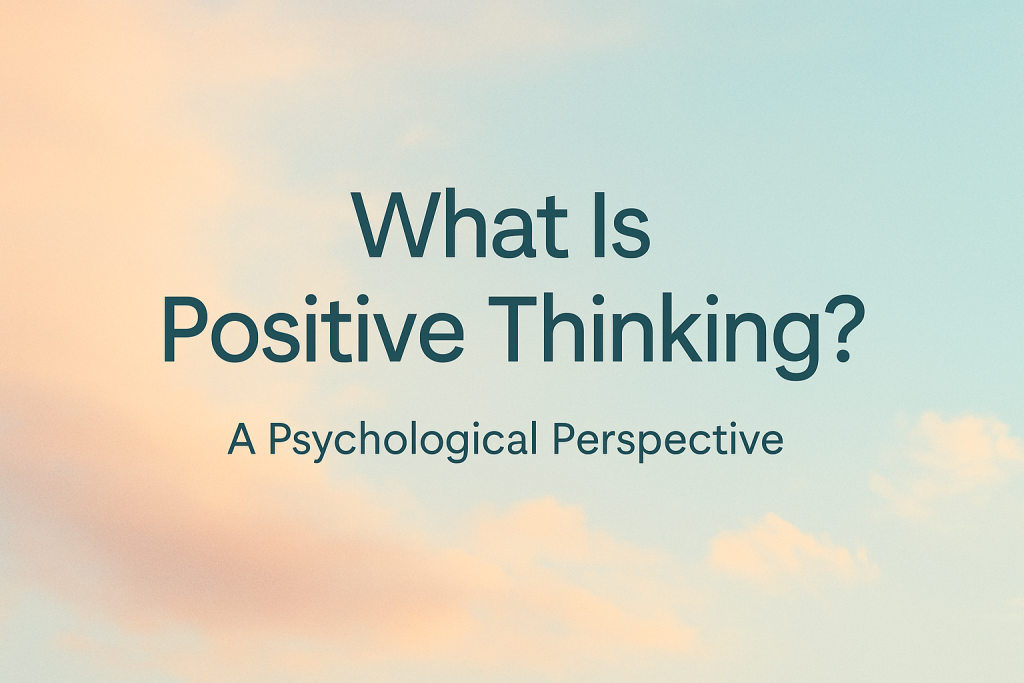What Is Positive Thinking? A Psychological Perspective
Explore how your mindset shapes your mental health, habits, and well-being
Feeling Stuck in Negative Thought Loops?
We all experience difficult days — when nothing seems to go right, our inner critic is louder than usual, and even small problems feel overwhelming. In these moments, someone might say, “Just think positive.”
But is positive thinking just wishful optimism? Or is it a psychological skill that can actually improve your life?
In this article, we’ll explore what positive thinking is through a psychological lens, how it connects to mindfulness, and what science says about the impact of your thoughts on your well-being.
—
What Is Positive Thinking?
A Mindset, Not Just a Mood
Positive thinking isn’t about ignoring reality or pretending everything is fine. It’s about choosing to focus on possibilities rather than problems, especially during challenges. In psychological terms, it refers to a mental attitude that sees setbacks as temporary, and believes in one’s ability to cope and grow.
Optimism vs. Toxic Positivity
It’s important to distinguish genuine optimism from forced positivity. True positive thinking allows space for negative emotions, while still holding a balanced, hopeful outlook. In contrast, “toxic positivity” denies or suppresses real feelings — which can do more harm than good.
—
The Psychology Behind Positive Thinking
Cognitive Behavioral Foundations
Cognitive Behavioral Therapy (CBT) teaches that our thoughts influence our feelings and behaviors. If you constantly think, “I’ll fail,” you’re more likely to avoid trying. But shifting that thought to “I can try, and improve if I fail” leads to more productive behavior and emotional resilience.
Neuroplasticity and Mental Rewiring
Studies in neuroscience show that positive thinking can physically rewire the brain. Practicing gratitude, reframing thoughts, or noticing successes — however small — activates areas of the brain linked to reward and motivation.
Link to Mindfulness
Mindfulness and positive thinking are deeply connected. Mindfulness teaches us to observe thoughts without judgment — which helps us recognize negative patterns and gently shift them. Rather than forcing positivity, mindfulness opens space for compassionate redirection.
—
Benefits of Positive Thinking
Improved Mental Health
People who consistently engage in optimistic thinking report lower rates of depression, anxiety, and stress. They’re also more likely to seek help, use coping strategies, and bounce back from setbacks.
Physical Health Benefits
Positive thinkers often enjoy better heart health, stronger immune function, and longer lifespans. This is likely due to a combination of reduced stress and healthier lifestyle choices.
Stronger Relationships
When you approach conversations with a solution-focused mindset and emotional regulation, others feel safer and more understood — building trust and deeper connection.
—
How to Cultivate Positive Thinking (Without Denial)
1. Practice Thought Awareness
Use mindfulness to notice automatic negative thoughts (ANTs) — like “I always mess things up.” Label them gently, and consider if they’re really true.
2. Reframe, Don’t Suppress
Instead of forcing a happy thought, try rephrasing. For example, change “I failed” to “I learned something I can improve on.” It’s not false — it’s flexible.
3. Keep a Gratitude Journal
Write down 3 things you’re thankful for each day. This simple act trains your mind to notice what’s working — not just what’s broken.
—
Conclusion: You Can Train Your Brain Toward Positivity
Positive thinking isn’t about ignoring problems — it’s about shifting how we respond to them. Backed by psychology and mindfulness, it’s a skill you can develop to live with greater clarity, compassion, and confidence.
You can’t always choose your circumstances — but you can choose how you relate to them.
✨ Want to start training your mindset today? Subscribe for weekly positive psychology tools, reflection prompts, and guided meditations to support your mental well-being.
